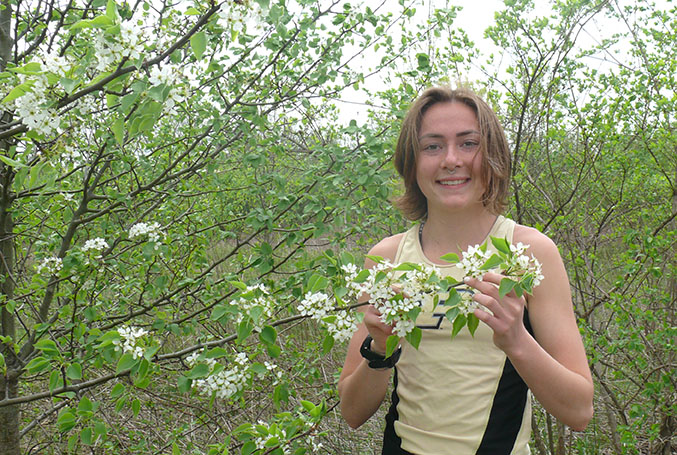Student-athlete runs into a career in plants
Editor’s Note: This story was written when Emma Tate was a junior. She earned her bachelor’s degree in plant science in 2023.
Before cross country meets, Emma Tate walks around the course to prepare for her event. When she lines up on the starting line, she mentally prepares herself for her 6K race and can hear the signal, “On your marks,” in her head. But sometimes, her survey of the course is a little different. Sometimes, she notices a little green on the side of the course, and as if the gun had been fired, Tate takes off. Not down the course, but toward the green plant she wants to learn more about.
Tate, a junior plant sciences major from West Lafayette, Indiana, has been able to use her experience on the Purdue Cross Country team to learn more about her passion, plants. Student-athletes travel a lot. Some try new foods at their destinations or learn more about architecture. Tate uses her time to find new plants and learn about them.
“When I see different plants when we are traveling, I have the natural instinct to learn more about them,” Tate said.
 Emma Tate, a junior plant sciences major from West Lafayette, Indiana, shows off some of the plants that line a Purdue Cross-Country course. Photo by Maranda Elswick.
Emma Tate, a junior plant sciences major from West Lafayette, Indiana, shows off some of the plants that line a Purdue Cross-Country course. Photo by Maranda Elswick. Tate’s curiosity about plants stems from her childhood. Her parents were involved with landscaping, so she was exposed to plants at a young age.
“I remember being puzzled as to why weeds were able to out-compete the plants and the grass that had been planted,” Tate said. “I also wondered what made fruits and vegetables larger at the grocery store.”
Asking questions is a big part of Tate’s life.
“I’m definitely driven by curiosity. I like to take in my surroundings and take mental pictures to remember the travel experiences that I have been able to have through Purdue,” she said.
When Tate was growing up, she would wonder about the plants she was working with. She would ask questions and look up plants online. Today, with her knowledge of ecosystems and plant growth, she is discovering new things and asking questions she never thought of before.
“The plants are really different throughout where we travel in the United States, so I always try to find the coolest plant on the course. I scan the plant with my app, Picture This, and then find some interesting information about the plant, such as why it grows, where it does, and how it got to that location.”
Tate said the favorite plant she has seen while traveling with Purdue Cross Country was in Tallahassee, Florida, for their nationals meet. It was a southern live oak covered with Spanish moss.
“The Spanish moss was growing from the trees and the limbs, creating a cool image of a canopy over the trees,” she said.
Tate also had a great experience spotting a field of common milkweed in Madison, Wisconsin. While milkweed grows in Indiana, the overall look in Wisconsin was much different.
“It created this white, cotton look in the grassy fields. It is something that we don’t see around here, so it was really cool, and my teammates were really curious about it as well,” Tate said.
Tate was so excited that she pointed out the cottony plants to her teammates.
“I remember when we saw milkweed again at Penn State,” Tate said. “My teammates were really excited and pointing them out. They were saying, ‘Hey! Those plants are over here, too!’”
Tate’s curiosity about plants has spread to her teammates on the cross-country team. When she is learning more about the different plants, her teammates are pointing them out, asking questions, and wanting to learn more. She said these experiences help her build relationships with her teammates through her passion for plants.
Tate’s curiosity and travel experiences have also helped her in the classroom. While she was taking a botany class, she was able to use the plants that she was seeing on the road for a project.
“We would have to find a plant every week that interested us, and I thought I would take it my own direction and find plants where I was traveling for meets,” Tate said.
She said she enjoyed being able to learn about the diversity of landscapes and expand her knowledge while also getting a grade. Learning more and being curious, especially about the plants she loves, is something Tate said will always be a big part of her life. That means learning more about plants along the cross-country course or wherever life takes her.
“I would always classify myself as a ‘forever student’ who wants to know as much information as possible,” she said.
Find out more
Purdue Botany and Plant Pathology
Maranda Elswick earned a bachelor's degree in agricultural communication in 2022 from Agricultural Sciences Education and Communication





